
|
Seemingly overnight, the COVID-19 pandemic changed virtually everything about our approach to our professional lives. The long-established daily routines of waking up in the morning, commuting to work, interacting with co-workers, attending meetings, and then driving home for the day evaporated for many in 2020. Instead, many employees turned to remote work, telecommuted in place of a literal drive, and adapted to a new reality where work and home had to learn to coexist like never before.
In 2021, more than a year after the COVID-19 pandemic began, hybrid work is overtaking remote work as the "new normal," and with a return to the workplace (at least in some capacity) on the horizon, millions of employees are thinking about their professional futures with a more critical eye. In 2020, 36% of the workforce turned to freelance work. When forced to think about going back to work, the decision for some Americans may simply be to quit altogether and strike out on their own.
So what does the entrepreneurial journey look like in 2021, and how many people are embarking on this path for the first time? To find out, we surveyed 250 entrepreneurs about their work, their lives, and what it took to get started. Read on as we explore how much money it takes to launch a new business; the biggest challenges entrepreneurs face along the way; the sacrifices they have to make in favor of the hustle; and how COVID-19 has affected their work.
So what should you expect when you first start your business? While every venture will have different needs, you may need to spend a little money before you can start thinking about making any. On average, entrepreneurs reported investing nearly $6,200 at the time they launched their business. And because there are no age limits to starting your own business, we found the average entrepreneur launched their business model when they were 30 years old and worked at least one other job on the side to help support themselves.
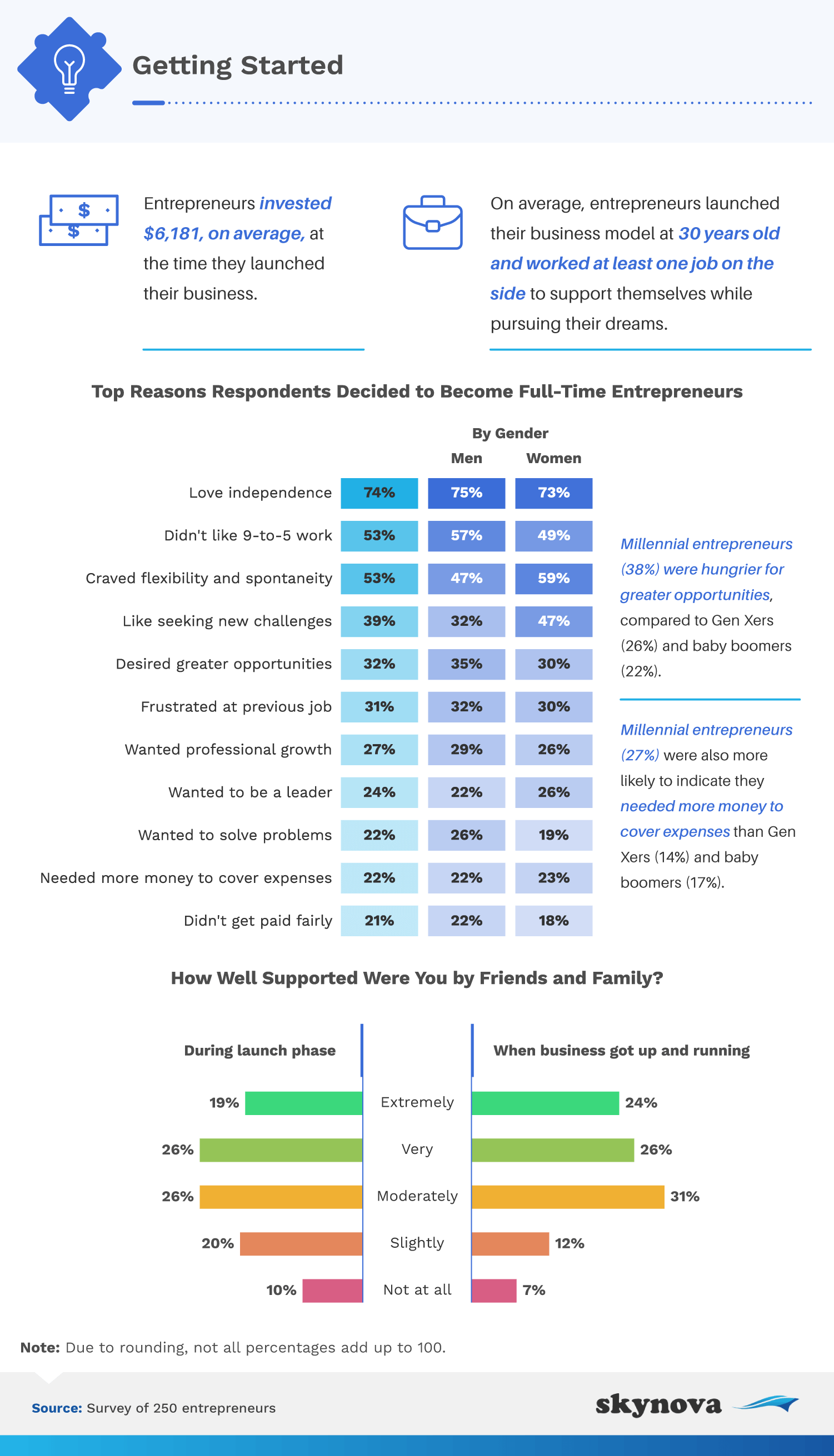
The most common reasons why people decided to be full-time entrepreneurs were that they loved to be independent (74%), didn't like their 9-to-5 jobs (53%), craved flexibility and spontaneity (53%), and liked seeking new challenges (39%). And while men were more likely to report valuing getting out of the 9-to-5 rut (57%), we found women were far more likely to report valuing flexibility (59%) and seeking new challenges (47%). Younger generations of entrepreneurs were also more likely to say they were hungry for bigger opportunities (38%), compared to 26% of Gen Xers and 22% of baby boomers.
For some business owners, the first year of entrepreneurship is the hardest. In addition to all of the hard lessons learned about self-marketing and keeping up with your finances, you may also find that support isn't as strong while you're trying to get off the ground. In the launch phase, less than 19% of entrepreneurs said they felt extremely supported by their friends and family, compared to nearly 24% of entrepreneurs who felt extremely supported when their business was up and running.
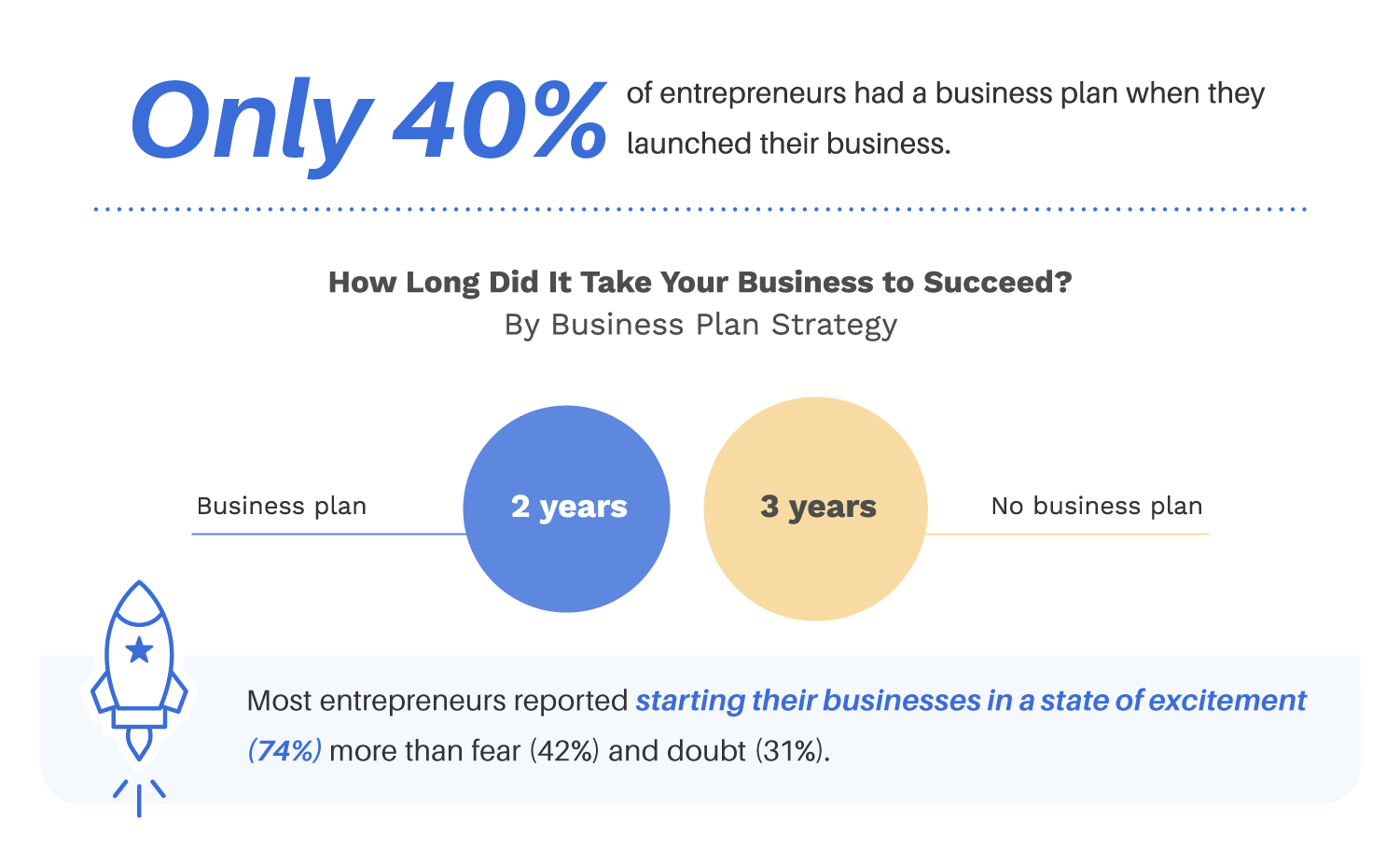
In thinking about your first year as an entrepreneur, it can be helpful to recognize the most common challenges business owners face in getting their enterprises off the ground. Overwhelmingly, 48% of entrepreneurs said their biggest challenge was dealing with the unknown. When you're first starting off, you don't know what you don't know, and the fear of all the things that might stand in your way can loom larger if you don't know what to anticipate. More tangible concerns include cash flow (44%), time management (43%), marketing strategy (40%), and self-doubt (40%).
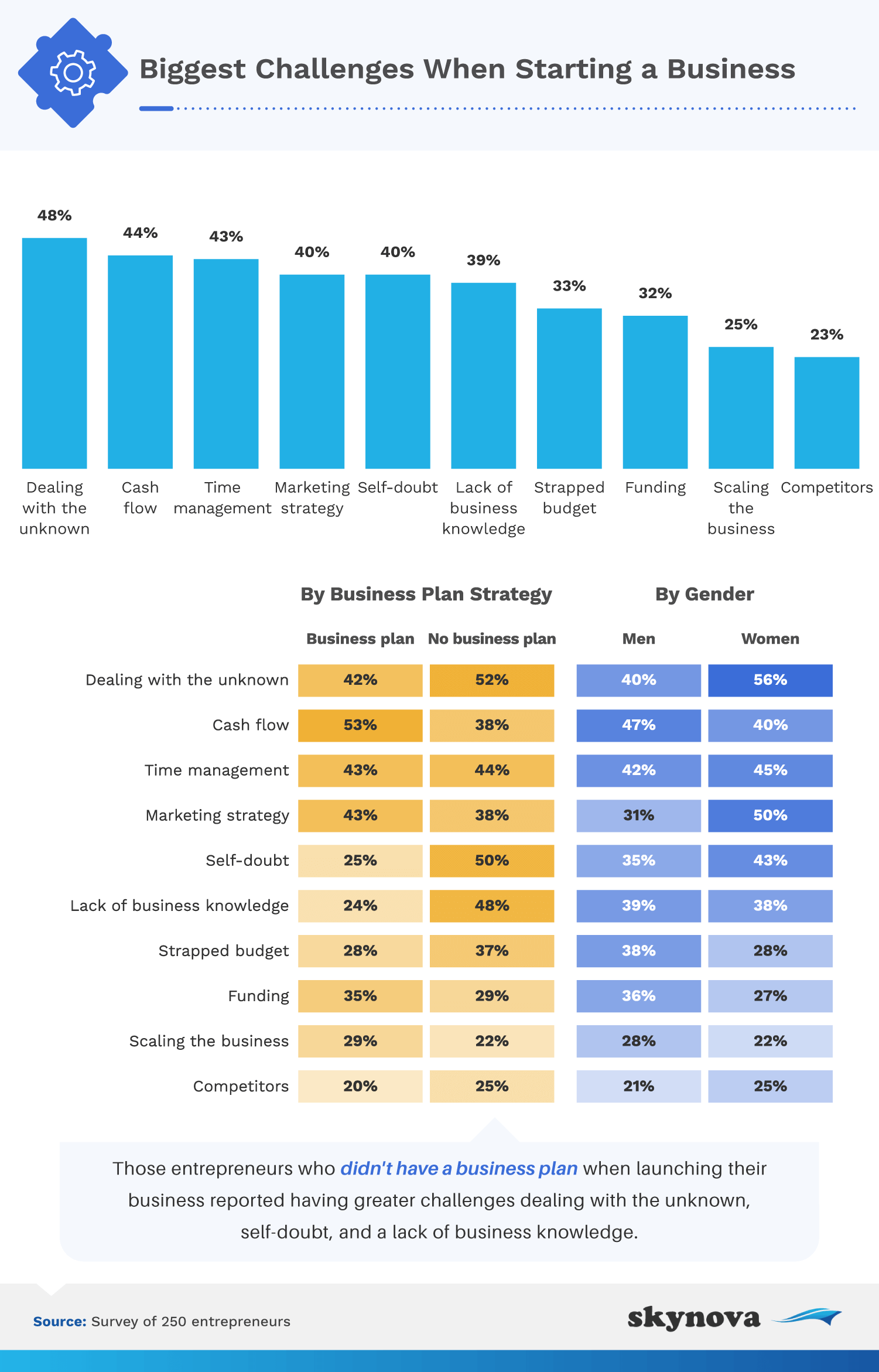
For some entrepreneurs, the kinds of challenges you face in getting your firm off the ground will change based on how prepared you are for the road ahead. Entrepreneurs with a business plan in place might also have more realistic expectations about what it takes to succeed, as 53% said they were worried about cash flow, compared to just 38% without a plan. On the other hand, entrepreneurs without a plan to rely on were almost twice as likely to report facing challenges in the form of self-doubt (50%) and a lack of business knowledge (48%).
Some aspects of entrepreneurship can also be more difficult for women. Women were far more likely to identify feeling challenged by dealing with the unknown (56%), marketing strategy (50%), and self-doubt (43%). In reality, there are some challenges women entrepreneurs are far more likely to experience, including having to overcome societal expectations, getting comfortable with being successful, and feeling like they have to balance their business life with traditional family roles.
As with any major goal you're committed to achieving, there can be sacrifices associated with becoming an entrepreneur. Among those surveyed, the biggest sacrifices in getting started included financial stability (64%), free time (55%), sleep (40%), and a social life (31%). While men and women were nearly equally as likely to report having to go without financial stability and losing their free time, men were far more likely to report losing sleep (44%) to their entrepreneurial ventures and not having a social life (38%).
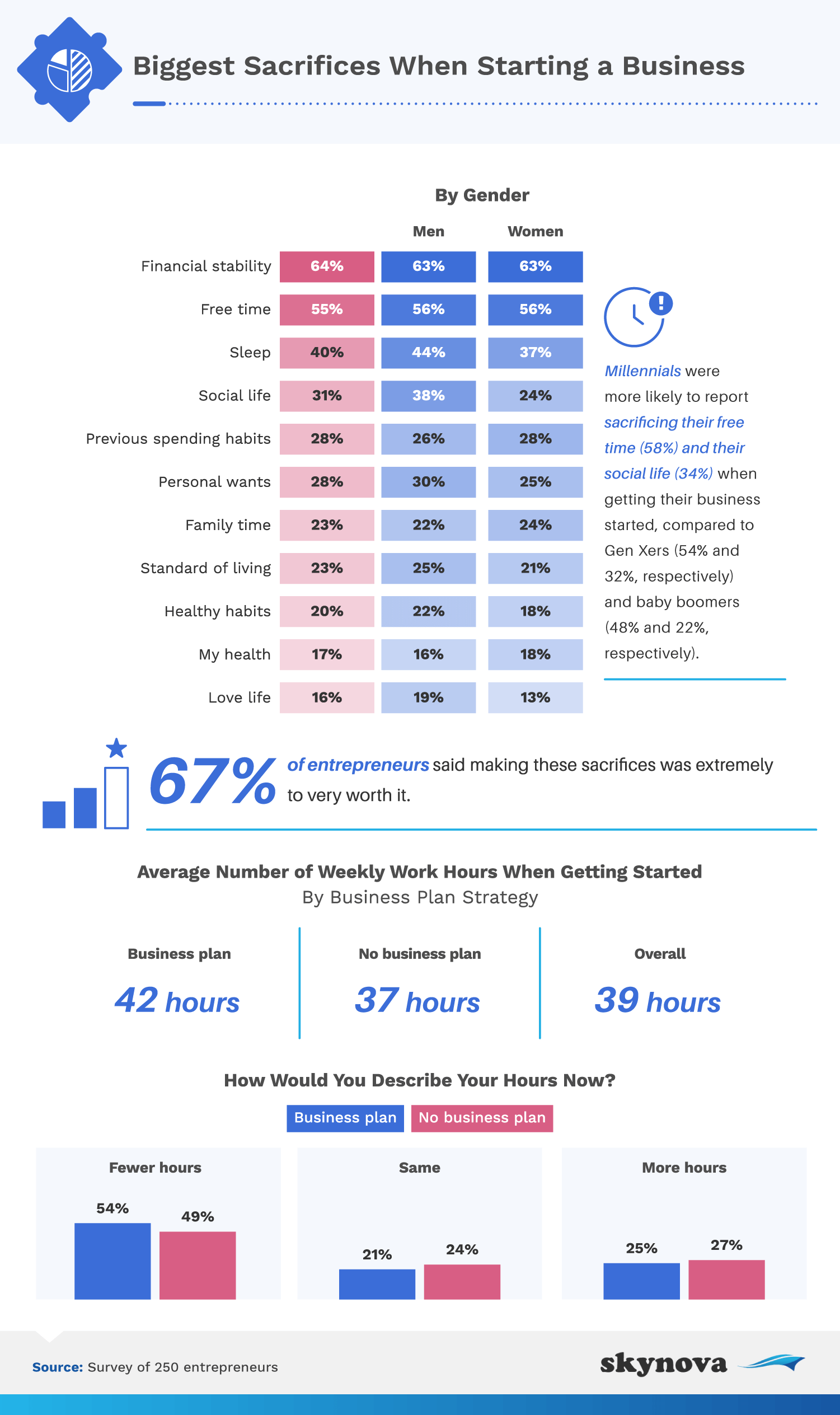
There might be things they have to give up along the way, but 67% of entrepreneurs said making those sacrifices was extremely or very worth it. And it can be helpful to know that for some, the challenges get easier to overcome. Entrepreneurs said they averaged 39 work hours a week when they were first getting started (and slightly more when they had a business plan in place), but 54% with a plan said they were working fewer hours now than when they started. At most, 27% of entrepreneurs without a business plan said they were working more hours now than when they started, and 25% of entrepreneurs with a plan said the same.
There's a common perception that your small business is more likely to fail than it is to succeed. In reality, only about 20% of small firms will fail in their first year, but what it means to "fail" can be different depending on the entrepreneur. We explore some of the key pitfalls that can cause firms to close before hitting the 10-year mark.
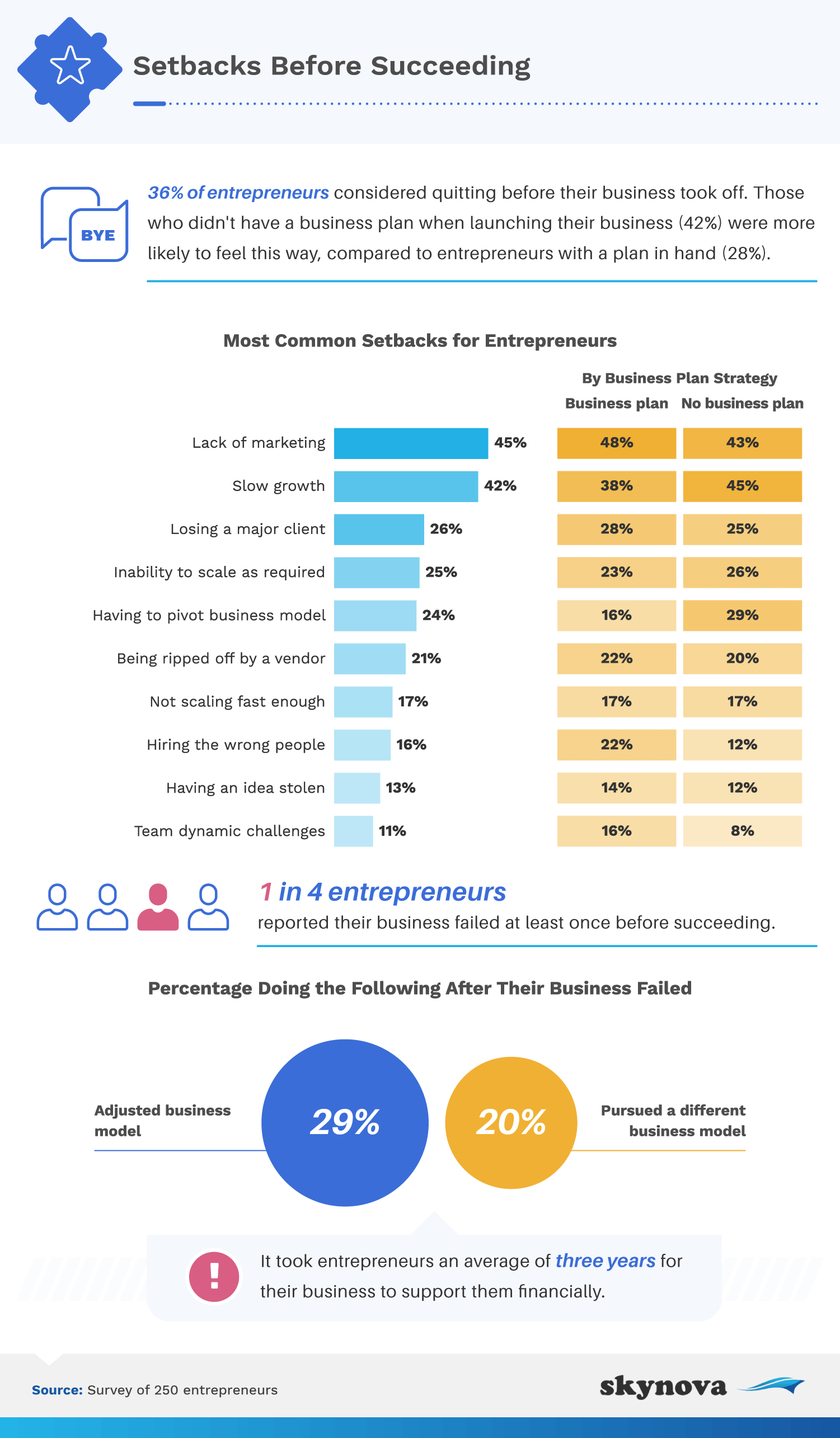
In thinking about their own ventures, 36% of entrepreneurs admitted they considered quitting altogether before their business finally took off, including 28% of entrepreneurs who started with a plan and 42% of those without one. The setbacks entrepreneurs were most likely to experience included a lack of marketing (45%), not growing fast enough (42%), losing a major client (26%), and not being able to scale when they wanted to (25%). Another quarter of entrepreneurs also said their business failed at least once before finally succeeding. And when one business model didn't work out exactly as anticipated, 29% of entrepreneurs opted to adjust their plans, while 20% said they opted to pursue a different model altogether. On average, entrepreneurs said it took three years before their business was able to support them financially.
As a result of the COVID-19 pandemic, more than 100,000 small businesses closed permanently in America, but millions more were affected. Among the entrepreneurs surveyed, 76% said the pandemic negatively impacted their business growth. The most common effects of the pandemic were loss of revenue (57%), loss of customers (39%), and having to pivot their businesses to adapt (33%). And while billions of dollars in funding and loans have been made available as a part of the COVID-19 relief packages for small businesses, just 8% of entrepreneurs surveyed reported having received a PPP loan for their business.
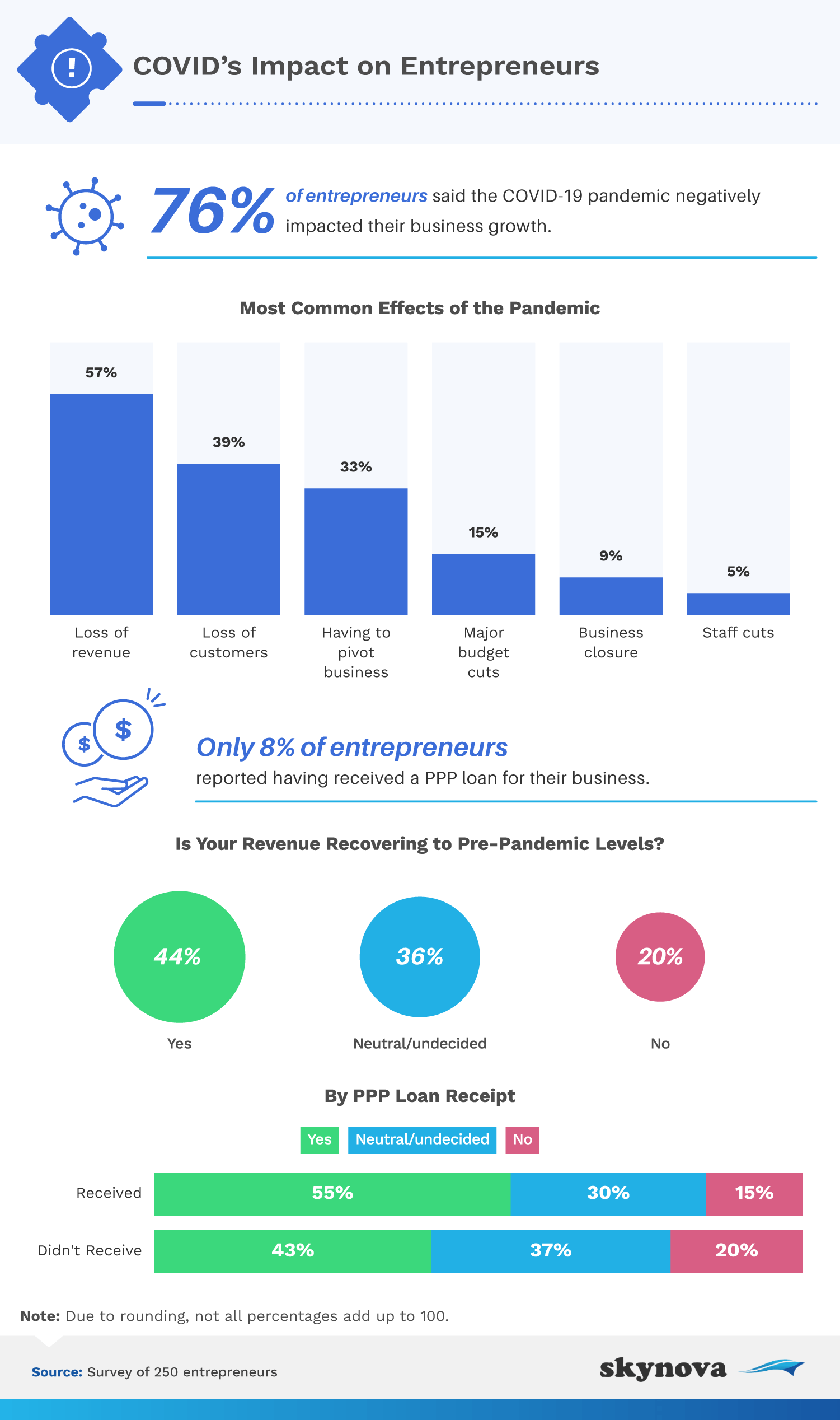
Thankfully, things are starting to look up for small businesses weathering the COVID-19 pandemic. Forty-four percent of entrepreneurs said their revenue was bouncing back to pre-pandemic levels, while 36% were unsure, and 20% disagreed. Business owners who received a PPP loan were more likely to indicate that their pre-pandemic revenue was returning to normal (55%), compared to entrepreneurs who hadn't received a PPP loan (43%).
Starting a small business and becoming an entrepreneur isn't an impossible dream, but it does take work, and the road may not be easy. Many entrepreneurs invest over $6,000 in getting their firms off the ground and wait years before their businesses are profitable enough to live off of. Along the way, there are challenges of self-doubt, fear of the unknown, financial concerns, and general lack of sleep.
And while the pandemic may not have made things easier, small businesses are starting to rebound, and entrepreneurs who go into their ventures with a plan to make things work generally have an easier time overcoming unnecessary hurdles. What stands between entrepreneurs and success isn't the same for men and women or even entrepreneurs of various ages, but a solid business plan and an idea of what the future holds is always a step in the right direction.
Skynova is a small business resource for creating professional invoices using a simple online platform that helps to analyze invoice data, manage finances, and stay organized as money enters and exits your firm. By helping small business owners save time and maximize their efficiency, customers have everything they need at their fingertips to streamline the invoicing process and get paid on their terms. With 37 different software modules designed to be used together or separately, you can build the invoicing solution that works best for your business without paying for programs you don't need.
We surveyed 250 entrepreneurs. Among them, 50.4% were men, 48.8% were women, and 0.8% preferred not to answer. Respondent ages ranged from 21 to 62 years old with an average age of 38.
For short, open-ended questions, outliers were removed. To help ensure that all respondents took our survey seriously, they were required to identify and correctly answer an attention-check question.
These data rely on self-reporting by the respondents and are only exploratory. Issues with self-reported responses include but aren't limited to exaggeration, selective memory, telescoping, attribution, and bias. All values are based on estimation.
Small businesses make up the backbone of the American economy, but most would-be entrepreneurs have concerns about starting their own. Share the results of these findings with them for any noncommercial use with the inclusion of a link back to this page in your story so they have access to our full findings and methodology.